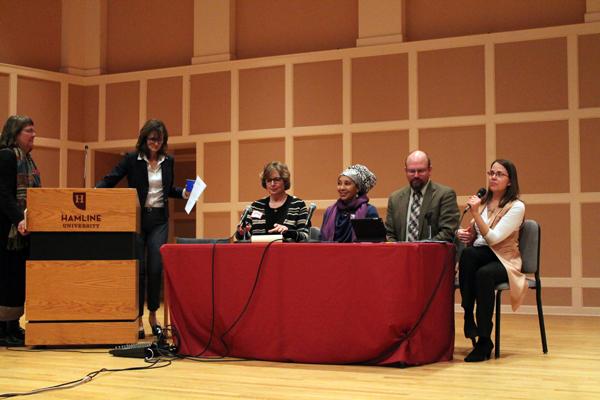Faith responds to trauma and illness
Dr. Shelly Rambo spoke on the concepts of spiritual trauma and resurrection during the Mahle Symposium’s keynote lecture.

Jasmine Lee, Senior Photographer
Rev. JoAnn Post, Dr. Monica A. Coleman, Dr. Todd Billings and Dr. Deanna Thompson participated in a panel response to the main lecture.
March 15, 2017
The themes of afterlife, trauma and resurrection were just a few of the overlapping topics from last Tuesday’s ninth annual Mahle Lecture, which found the theology portion of Hamline’s campus abuzz with religious zeal at the keynote address held within Sundin Music Hall.
The room was filled with people of all faiths, including theologians, local pastors, rabbis, reverends and Hamline’s very own Spirituality Scholars. This year’s keynote address was put forth by Dr. Shelly Rambo, who works at Boston University’s School of Theology, and she chose to pursue the topic of Resurrection in the Afterlife of Trauma.
Rambo began her lecture by asking a question: “How would you describe the present moment in which we find ourselves?”
Rambo went on to speak about some of the responses that she had already received. They were worrying to her, as people answered with “anxious, regretful, fractured, a Great Awakening”— each of these often having a political aspect of their own.
“One striking aspect of our present moment is that wounds of history are surfacing on our collective skin,” Rambo said. “This calls for one of the most essential insights of trauma: that the past is not in the past.”
She then explained how such insights were pushing Christian theology into a new light.
This new perspective of theology would focus upon the issues of trauma not just within one generation, but through multiple generations. The core idea that Rambo puts forth is that many of the issues and injustices that have happened to our ancestors can and often do have an effect on our daily lives. These instances of psychological trauma would then surface on individuals as “invisible wounds” as Rambo put it.
One person of interest at the event was Kathi Austin Mahle, a member of the Hamline Board of Trustee and major contributor behind the Mahle Symposium.
“We feel that the progressive Christian voice needs to be lifted up more broadly as a counterpoint to a very conservative Christian voice that is seen as the Christian voice in this country,” Mahle said.
Leading up to Rambo’s keynote address were multiple workshops that revolved around “Healing, Wholeness, Holiness: Religious Responses to Trauma and Illness,” the title of the two day long Mahle workshops and lectures. These workshops were put on by a series of guest speakers including: Dr. Monica Coleman, Rambo, Rabbi Eric Weiss and Professor of Religion, Dr. Deanna Thompson.
Thompson was awarded a grant from the Louisville Institute and played a significant role in organizing the event. It is helping her with her own research, as she is on sabbatical this year working on her new book that revolves around trauma and illness.
During an open dialogue conversation with Rambo and Weiss, Thompson talked about how stories of trauma need to breathe. She talked about how we need to make space for the multiple perspectives and interpretations of theology and scripture and help one another heal.
“We don’t care where the healing is coming from, we just know when it is there,” Rambo added. “[We need to view] healing as truth telling, healing as creating space.”

Deanna A Thompson • Mar 16, 2017 at 7:53 am
Thanks for this informative article about last week’s exciting Symposium. We’ve been getting really good feedback about how helpful to look at illness through the lens of trauma and the resources religion can offer to help move toward healing.